 |
» |
|
|
 |
 |
|
 |
 |
 |
Ravindhar Uppada & Avinash Bilumane Lingappa, IBM Interconnect Engineering
|
 |
 |
 |
 |
|
 |
 |
HP SNA Server for OpenVMS Alpha (SNA Server) is a layered software product that allows appropriately configured OpenVMS Alpha or VAX systems to be part of an IBM Systems Network Architecture (SNA) network. After installing the SNA Server and one or more SNA access routines, you can perform the following functions:
- Access IBM application programs or other system resources
- Act as 3270 display station
- Exchange data files and documents with an IBM host
- Implement distributed application programs that run between the OpenVMS Alpha and IBM systems
HP SNA Server for OpenVMS will not be ported to HP Integrity servers. However, you can use the following communication options for an OpenVMS Integrity server system to become part of an IBM SNA network:
- HP SNA Access Server for Microsoft® Windows® (Access Server)
- HP DECnet SNA Gateway for Synchronous Transport (ST)
- HP DECnet SNA Gateway for Channel Transport (CT)
- Mainframe Gateway for OpenVMS (MGO)
You can also continue to run HP SNA Server for OpenVMS Alpha or VAX systems and move the applications on to Integrity servers. The applications can access the SNA Server through DECnet or TCP/IP. This solution can be used only if you would like to retain the existing Alpha or VAX systems to run the SNA Server.
Refer to Table 1 in Appendix A for the SNA gateways compatible with OpenVMS applications. Table 2 shows the requirements for communication between OpenVMS systems and the mainframe.
|
 |
 |
|
 |
 |
This paper is intended for anyone using HP SNA solutions based on OpenVMS systems. It is also intended for HP customer support representatives.
|
 |
 |
|
 |
 |
The Access Server has the following components that are implemented as part of Microsoft Windows Server services:
- APPC service, which supports the OpenVMS SNA LU6.2 applications
- Basic service, which supports the layered OpenVMS SNA applications that are not LU6.2-based, such as LU types 0, 1, 2, and 3
The APPC and Basic services provide the means for OpenVMS SNA applications to use Microsoft Host Integration Server (HIS) for connecting to IBM SNA-based systems.
The Access Server is a member of the HP SNA Gateway product family. It allows you to exchange information and share resources between configured OpenVMS systems in DECnet and TCP/IP environments in a bidirectional manner. This server works in conjunction with the Microsoft HIS and an IBM system in an SNA environment.
It provides a means for OpenVMS access routines and custom applications developed using the HP SNA APPC/LU6.2 Programming Interface for OpenVMS to work across the Microsoft HIS with little or no modification to the applications.
The Access Server enables the Microsoft HIS to function as an HP SNA Gateway between TCP/IP or DECnet networks and an IBM SNA network.
The minimum hardware requirement is a Windows system with 64 MB memory and a network adapter supported by Microsoft HIS. Figure 1 illustrates the network configuration using Access Server Gateway.
Figure 1. Network configuration using HP Access Server for Windows
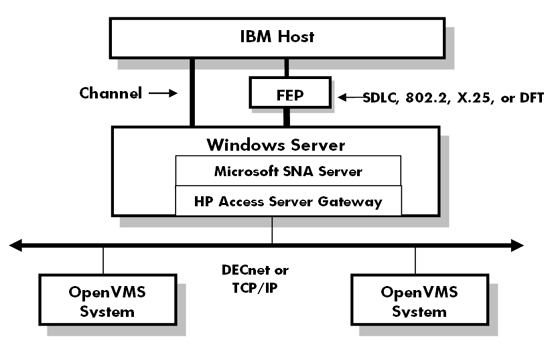 Features
Features
The Access Server provides the following features:
- Will support a total of 2,000 simultaneous OpenVMS access routine connections, which can be a combination of access routines over DECnet and TCP/IP
- Offers flexible communication between networks, providing both hierarchical and peer LU communication
- Supports connections for LU types 0, 1, 2, and 3 or LU type 6.2 connections between IBM application programs on an IBM SNA network and multiple operating systems (Windows and OpenVMS) running on DECnet or TCP/IP networks
- Supports APPN network configuration for program-to-program connection between IBM applications and OpenVMS
|
 |
 |
|
 |
 |
HP DECnet SNA Gateway-ST is a member of the DECnet SNA Gateway product family. This family consists of hardware and software products that allow you to exchange information and share resources between the appropriately configured OpenVMS systems in a DECnet environment and IBM systems in an SNA environment.
Gateway-ST can be used to connect the DECnet and SNA networks. It can be used by a wide variety of HP-supplied access routines running on OpenVMS Integrity servers, and in Alpha, VAX, and Tru64 UNIX operating environments. Gateway-ST is managed and configured using the DECnet SNA gateway management software that is included with HP DECnet SNA Gateway-ST.
Figure 2 illustrates the network configuration using DECnet SNA Gateway for Synchronous Transport.
Figure 2. Network configuration using DECnet SNA Gateway-ST
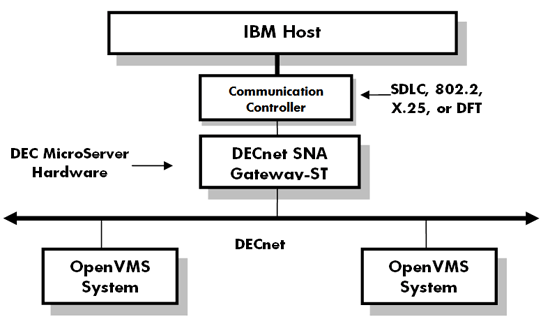 Gateway-ST is part of both the DECnet and SNA networks. Architecturally, it is a DECnet Phase IV end-node implementation to DECnet and a Physical Unit (PU) Type 2.0 to SNA. It provides bidirectional network access between DECnet and SNA networks.
The Gateway-ST works with either of the DEC MicroServer hardware platforms. The DEC MicroServer (DEMSA-S*) provides connectivity for up to four synchronous lines; DEC MicroServer-SP (DEMSB-S*) provides a single synchronous line connection.
Note:
Gateway-ST is part of both the DECnet and SNA networks. Architecturally, it is a DECnet Phase IV end-node implementation to DECnet and a Physical Unit (PU) Type 2.0 to SNA. It provides bidirectional network access between DECnet and SNA networks.
The Gateway-ST works with either of the DEC MicroServer hardware platforms. The DEC MicroServer (DEMSA-S*) provides connectivity for up to four synchronous lines; DEC MicroServer-SP (DEMSB-S*) provides a single synchronous line connection.
Note:
The term "DEC MicroServer" refers to a hardware device.
Features
The following functionalities provided by Gateway-ST are comparable to those of the SNA Server software:
- Gateway-ST appears to the SNA network as a PU Type 2.0 node
- Gateway-ST supports SNA synchronous communications using the SDLC protocol
The number of links supported depends on the hardware unit that is used. Using the DEC MicroServer (DEMSA-S*) hardware supports the following:
- Four SDLC line connections
- 128 concurrent SNA Logical Unit sessions per PU
Using the DEC MicroServer-SP (DEMSB-S*) hardware supports the following:
- One SDLC line connection
- 32 concurrent SNA Logical Unit sessions per PU
Restrictions
Deployment of the DECnet SNA Gateway-ST communication option depends on the availability of hardware - DEC MicroServer hardware is mandatory. For details regarding DEC MicroServer support, contact an HP representative through a standard support channel. The gateway hardware devices are no longer offered from HP, so this gateway is an alternative only if the gateway already exists.
|
 |
 |
|
 |
 |
HP DECnet SNA Gateway for Channel Transport is a member of the DECnet SNA Transport product family. This family consists of hardware and software products that allow you to exchange information and share resources between appropriately configured OpenVMS systems in a DECnet environment and IBM systems in an SNA environment.
Gateway-CT can be used to connect the DECnet and SNA networks. It can be used by a wide variety of HP-supplied access routines running on OpenVMS Integrity servers, and in Alpha, VAX, and Tru64 UNIX operating environments. The Gateway-CT is managed and configured using the DECnet SNA gateway management software that is included with HP DECnet SNA Gateway-CT.
Gateway-CT is part of both the DECnet and SNA networks. Architecturally, it is a DECnet Phase IV end-node implementation to DECnet and PU Type 2.0 node to SNA. It provides bidirectional access between the DECnet and SNA networks.
The Gateway-CT software is supported on the DEC ChannelServer (DESNA-Ax) and DEC ChannelServer II (DESNB-Ax) hardware platforms. Both hardware systems connect directly to Ethernet local area network (LAN) and IBM S/370 Byte Multiplexer, Block Multiplexer, or Selector channel. When used with Gateway-CT, both systems provide SNA connectivity to any DECnet system in a DECnet network.
Note:
The term "DEC ChannelServer" refers to a hardware device.
Figure 3 illustrates the network configuration using DECnet SNA Gateway-CT.
Figure 3. Network configuration using DECnet SNA Gateway-CT
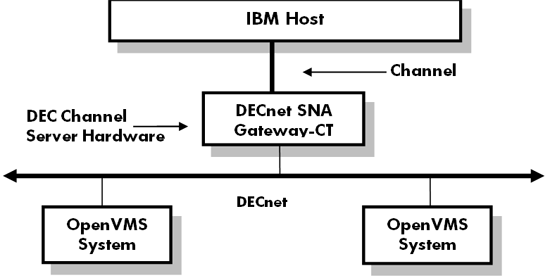 Features
Gateway-CT provides the following features:
Features
Gateway-CT provides the following features:
- Appears to the SNA network as a PU Type 2.0 node
- Supports only channel connectivity with SNA
Restrictions
Deployment of the DECnet SNA Gateway-CT communication option depends on the availability of hardware - DEC ChannelServer hardware is mandatory. For details regarding DEC ChannelServer support, contact an HP representative through a standard support channel. The gateway hardware devices are no longer offered from HP, so this gateway is an alternative only if the gateway already exists.
|
 |
 |
|
 |
 |
The Mainframe Gateway for OpenVMS can serve as an alternative to any of the HP SNA Gateway products. This software-only solution, developed by Data Access Incorporated (DAI), executes on an IBM mainframe. DAI offers a wide variety of IBM mainframe-related software products and services. This product is designed to work with HP products, but it is the sole property of DAI. For more information on DAI gateways, go to:
» http://www.data-access-inc.com/html/gateways.html
MGO can be used as an alternative to the SNA gateways (CT, ST, Access Server, or SNA Server) used with OpenVMS application programs. It is a software solution only, and no new or additional hardware is required for implementing this communication option. No additional new software is required for installation on OpenVMS systems.
After the MGO software is installed and configured on the IBM mainframe, MGO appears to the OpenVMS systems as another HP SNA gateway. Figure 4 illustrates the network configuration using MGO.
Figure 4. Network configuration using MGO
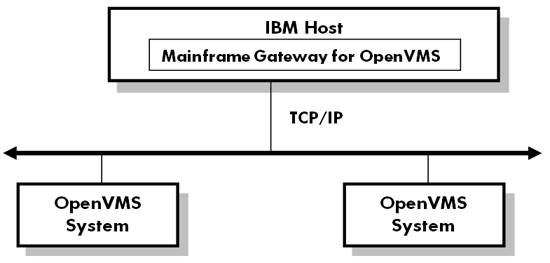 MGO is associated with a number of SNA Logical Units (LUs), like any other HP SNA Gateways. Each OpenVMS application program uses one or more of these LUs to communicate with the other components in the SNA network. MGO requires no changes in the OpenVMS application programs; configuration changes are only required on the OpenVMS systems.
Features
MGO provides the following features:
MGO is associated with a number of SNA Logical Units (LUs), like any other HP SNA Gateways. Each OpenVMS application program uses one or more of these LUs to communicate with the other components in the SNA network. MGO requires no changes in the OpenVMS application programs; configuration changes are only required on the OpenVMS systems.
Features
MGO provides the following features:
- Compatible with all OpenVMS applications using any HP SNA Access routines
- Is IP-based and implemented on the IBM mainframe; can communicate with OpenVMS Alpha or Integrity server systems
- Can be used to replace any current HP OpenVMS SNA Gateway product
MGO provides the following advantages over other communication systems:
- SDLC and X.25 communication lines dedicated to OpenVMS systems are no longer needed.
- Separate SNA and IP networks are not required.
- HP hardware gateways are not required.
- Faster data transfer speeds are provided.
- It is a reliable system since no hardware - such as Gateway-CT, Gateway-ST, or 3745 IBM front-end processor - is required.
- TCP/IP is used instead of DECnet or SDLC.
- Yearly service and support charge is low.
|
 |
 |
|
 |
 |
Table 1 lists the various SNA gateways compatible with OpenVMS applications using any
HP SNA Access routines. Table 2 lists the communication requirements between an OpenVMS system and a mainframe.
Table 1. SNA gateways compatible with OpenVMS applications
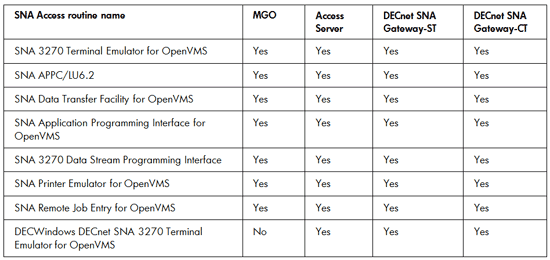 Table 2. Communication requirements between an OpenVMS system and a mainframe
Table 2. Communication requirements between an OpenVMS system and a mainframe
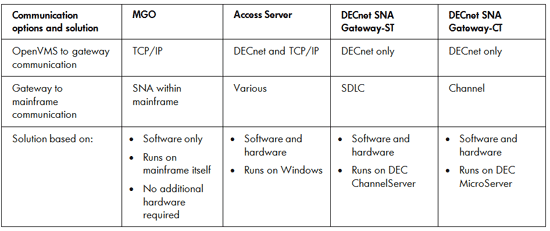
|
 |
|